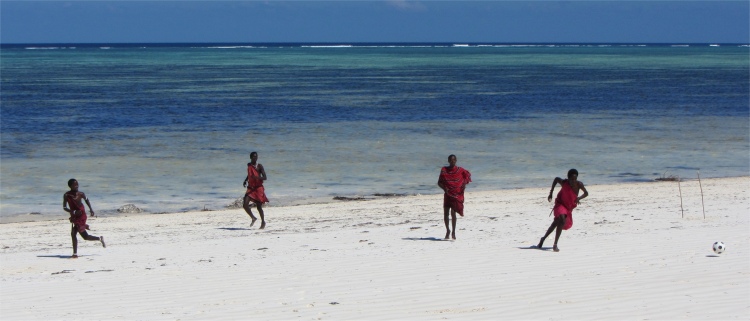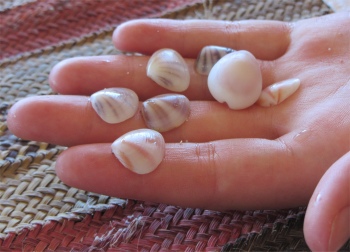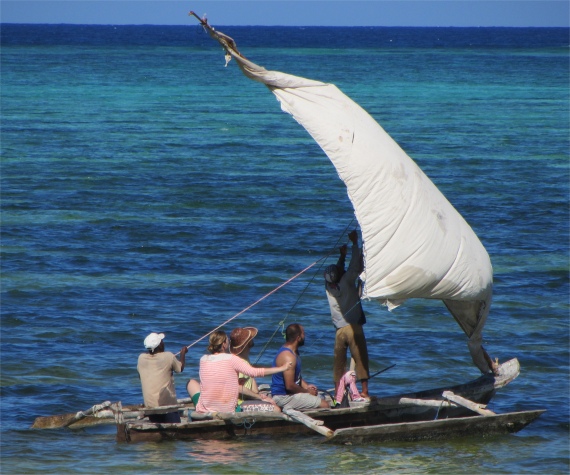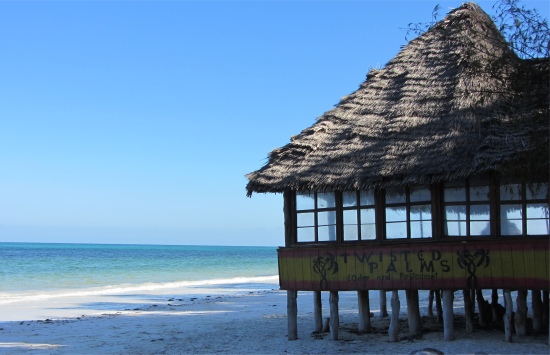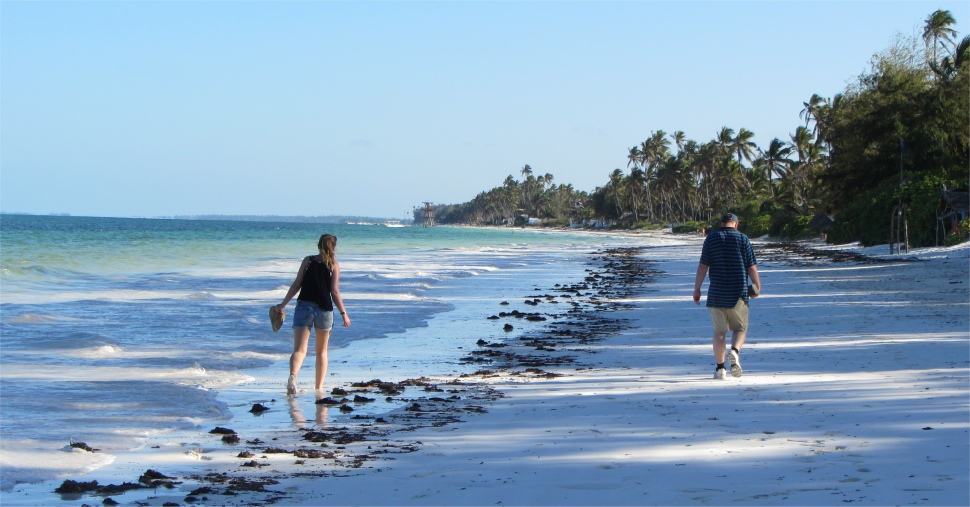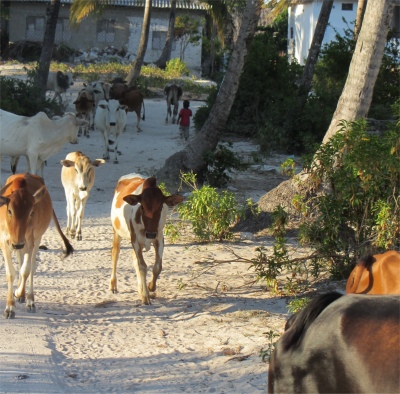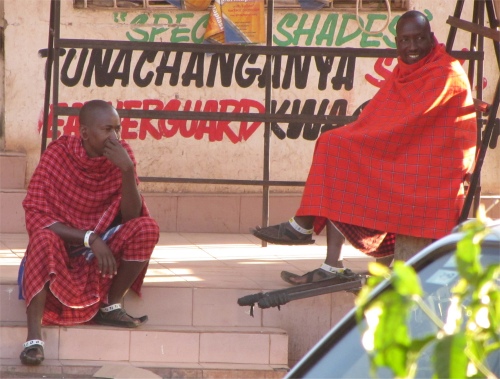 Moshi Maasai |
Young children, mainly girls, could be seen heading off to school, small groups of them wearing white head scarves - presumably Muslim.
On our return to our hotel, we collected our kit and wandered down to Gladys's office, hoping to meet up with her again and thank her for the excellent safari. Sadly she was not there, in fact the office was shut. It was now 07:55, and we had arranged with Nelvin the previous evening that we would be taken to the airport at 8am. The allotted hour approached, and our transport was nowhere to be seen. I panicked, we couldn't leave it much longer, so I headed off to scout for a taxi. After I had covered 100m, I heard a large shout behind me, "Dad!" It was Dan, who had sprinted to catch me and inform me that the transport had turned up, probably at 8am on the dot. I felt a bit silly with myself then, this was Africa after all, and there is always a little slackness in timings. We were somewhat relieved, and Robson, our driver, helped store our kit in the shuttle van, and off we sped to Kilimanjaro International Airport.
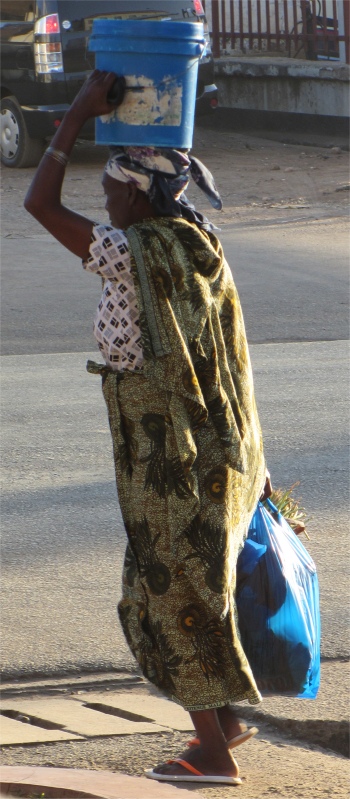 Off to Moshi Market |
We passed by Kilimanjaro one last time, proudly standing in the clear morning air with its cap of snow; the tallest mountain in Africa, a majestic and moving sight. I wondered how many people were climbing its slopes this morning. Dala-dalas passed by us, with youths hanging out of the open door, shouting and waving frantically with beaming smiles.
Presently, we reached the airport, a fairly functional set of buildings and operations. Just at the entrance door, a young woman checked passports and tickets, then 10m behind her were the check-in desks. On check-in I presented our passports and flight confirmation document. After a pause, the young man scratched his head and stated, "This is not your ticket. Where is your ticket?" Cold realisation set in, for this Precisionair flight, I had only printed out the flight confirmation, not the ticket. This was the first time ever I had been asked for a ticket, at all other times my passport had sufficed. He was adamant I needed one. The young fellow kindly escorted us out of the building to a Precisionair office next door. Here sat a stocky chap who was clearly up to his neck multitasking umpteen issues from other passengers besides us. He plonked a keyboard with his stocky fingers, handling two conversations on mobile phones simultaneously. His two lackeys seemed to serve no purpose at all. "What is the problem?" he asked. I explained the situation, and then he made a series of phone calls, requesting the credit card details I had used for the booking process. "Sit down there, please," he commanded, pointing to the one remaining seat in the office. I sat while he dealt with the next two passengers' problems, and one of his assistants checked her fingernails while the other yawned. After 10 minutes he received a call relevant to us, and soon we had freshly printed tickets in our hands. "Asante sana!" I shouted as we headed back to join the back of a now very long queue to the check-in desk. There were no further incidents and we safely boarded our flight to Zanzibar.
During the course of the flight I had a chance to reflect on our safari. As I have said earlier, a safari is not something I personally would have naturally chosen to undertake. I had never really enthused over visiting caged animals in zoos in the past, my visits just rationed to those times when I took my children to those establishments. However, my mind is never completely closed, and being in Tanzania, going out on safari is a "must do". After all, seeing animals in the wild could be an enlightening experience. And so it was that we came to be undertaking a safari in this vast land.
Organising it was not an arduous task, due to the safari company we chose to use. I had done some research, and coupling this with a recommendation from one of Sally's friends, we opted for Gladys Safaris. All communications were done via email, and it was always with Gladys herself; consistency helps. She had been extremely patient and helpful in sorting out the details over a period of weeks; nothing had been too much trouble. Her warm welcoming smile and assuring air confirmed that we had picked a good egg.
Gladys had done us proud by choosing Kepha as our driver and guide, plus Erasto as our chef. These lads complimented each other splendidly and formed an admirable team. They had done their utmost to ensure our safari was a memorable experience. We had been expertly shown the wonders of this land, well informed, educated in Swahili, and eaten like kings. What more could we ask for?
For me, to see the wealth of different animals in both variety and quantity, in the wild, roaming freely as they were meant to be, was a mind-blowing experience, an essential ingredient of the spirit of Africa. And to see the annual migration, with enormous herds stretching from horizon to horizon, was an emotional experience. I had witnessed a primeval scene that had existed for millennia, and hopefully will continue for millennia to come.
And all this wildlife was an overlay carpeting absolutely stunning scenery fringed by glorious daybreaks and sunsets. Unforgettable!
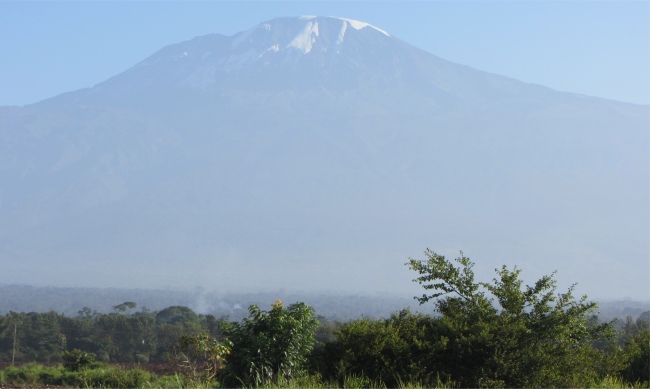 Last Lingering Look at Kilimanjaro |
Africans are known to have inhabited both Zanzibar and Pemba islands possibly before the birth of Christ. The original African inhabitants of Zanzibar are believed to have migrated from the African mainland, probably and initially in search of better fishing facilities on a seasonal basis. Due to the lack of political unity based on an inter-tribal organization throughout the islands, the settlers remained vulnerable to attack and were liable to conquest by Asiatic and European countries whose nationals travelled from time to time through the centuries to the East Coast of Africa in search of trade and adventure.
While most of Europe was still floundering in the Dark Ages, the light of the Oriental world had already fallen on Zanzibar. Early visitors to Zanzibar and Pemba included Persians, Hindus, Jews, Arabs, Phoenicians and possibly Assyrians. They arrived on the East African coast with the monsoon and left again, their holds groaning with trade goods. They brought metal tools, weapons and jewellery and took away ivory, tortoiseshell, slaves and palm oil. The 9th Century Tales of Sinbad the Sailor from the eastern fairy-tale Arabian Nights reflect the seafaring tradition of the people of the Persian Gulf. It was they who named the coast Zanj el Barr, meaning "land of black people". Ancient African settlers therefore had contact with a potpourri of cultures and managed not only to survive and absorb some of the newcomers, but also to adopt many of their political, economic and social methods of organization. The Africans did not seem to have put up any resistance to these invaders but they became used to their comings and goings which were dictated by the seasonal monsoon winds. Because of the African inherent vulnerability, which was due to the absence of unity among the various ethnic groups, Arabs were able to establish a colonial regime in the islands.
Ancient traders from Shiraz, then a small town in southern Iran (Persia), began in about the tenth century A.D. to arrive in Zanzibar in large numbers and to intermarry with local Bantu people there. They used Zanzibar as a base for voyages between the Middle East, India, and Africa and established garrisons on the islands.
Vasco da Gama's visit in 1498 marked the beginning of European influence. Around 1503, Zanzibar became part of the Portuguese Empire when Captain Ruy Lourenšo Ravasco Marques landed and demanded and received tribute from the sultan in exchange for peace. By 1729, with their Indian empire in disarray, the Portuguese were forced to flee Tanzania by the Omani Arabs. The establishment by the Muscat Arabs of an Arab colonial state in the nineteenth century was a relatively recent affair.
Slaving had gone on for at least 2000 years, but under the Zanzibar sultans it reached its awful peak. Up to 30,000 slaves a year were brought to Zanzibar in the early 1870s, to work the clove plantations or to be sold in the market. Great caravans left Bagamoyo for the interior, returning with slaves and ivory. Zanzibar traders made fortunes, and helped to depopulate huge areas.
The power of the sultans dwindled as the British exerted diplomatic and military authority. Control of Zanzibar eventually came into the hands of the British Empire; part of the political impetus for this was the 19th century movement for the abolition of the slave trade. Reluctantly, Sultan Barghash closed the slave market in Zanzibar in 1873. The relationship between Britain and the German Empire, at that time the nearest relevant colonial power, was formalised by the 1890 Heligoland-Zanzibar Treaty, in which Germany agreed to "recognize the British protectorate over ... the islands of Zanzibar and Pemba". That year, Zanzibar became a protectorate (not a colony) of Britain.
The death of the pro-British Sultan Hamad bin Thuwaini on 25 August 1896 and the succession of Sultan Khalid bin Barghash, who the British did not approve, led to the Anglo-Zanzibar War. On the morning of 27 August 1896, ships of the Royal Navy destroyed the Beit al Hukum Palace. A cease fire was declared 38 minutes later, and to this day the bombardment stands as the shortest war in history. From 1890 to 1913, traditional viziers were appointed to govern as puppets, switching to a system of British residents (effectively governors) from 1913 to 1963. Zanzibar was declared independent in 1963. The two territories of Zanzibar and Tanganyika merged into the United Republic of Tanganyika and Zanzibar, which was later changed to Tanzania.
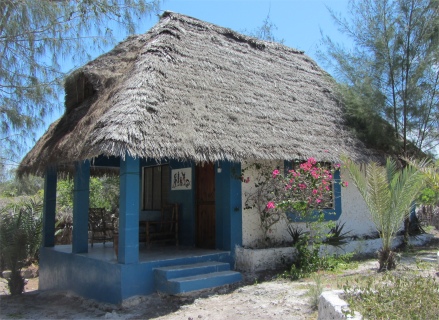 Sally's Bungalow |
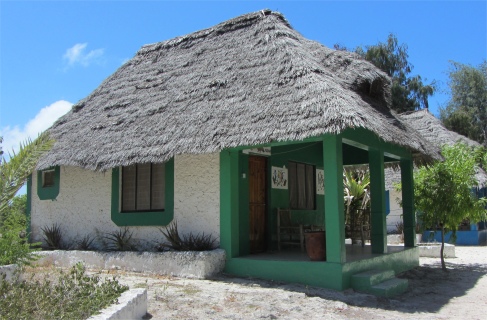 Dan and I Opted for This One |
After a few paperwork preliminaries, we were out of the airport and in a cab heading out to Bwejuu on the eastern side of the island. Sally had already visited Zanzibar with her cousin and partner, and knew well that ATMs could only be found in the vicinity of the airport and Stone Town, so we took the wise precaution of getting the driver to pull in at an ATM before we had travelled too far away from civilisation.


